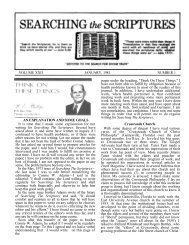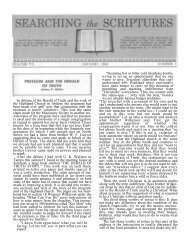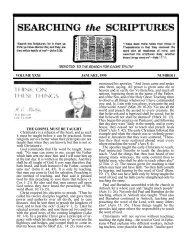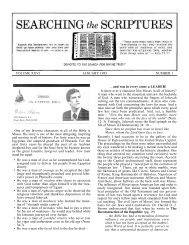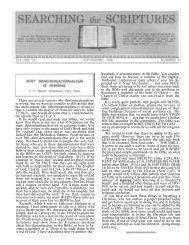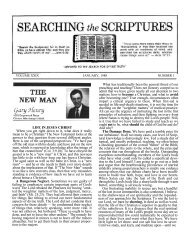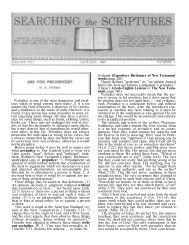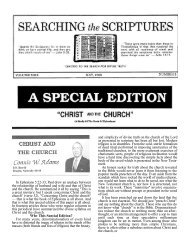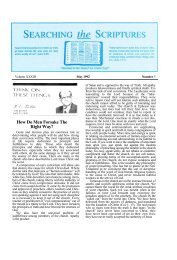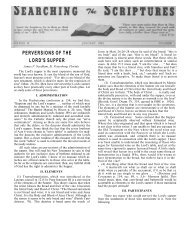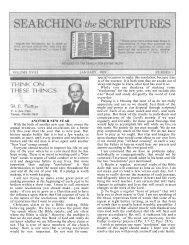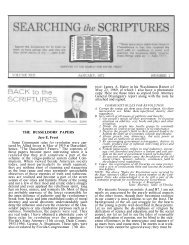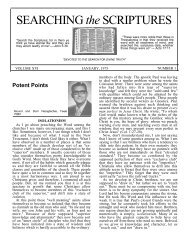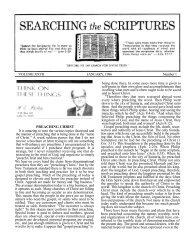Volume 21 – 1980 (PDF) - Searching The Scriptures
Volume 21 – 1980 (PDF) - Searching The Scriptures
Volume 21 – 1980 (PDF) - Searching The Scriptures
Create successful ePaper yourself
Turn your PDF publications into a flip-book with our unique Google optimized e-Paper software.
Page 4<br />
they had "the light" of divine knowledge, their message<br />
was authoritative and not to be rejected.<br />
(3) Witnesses. <strong>The</strong> faith was "delivered" by witnesses<br />
who saw the Lord, heard him speak, knew directly of<br />
his deeds and could speak as eye witnesses of his<br />
resurrection. Jesus said to them just before his<br />
ascension "But ye shall receive power, after that the<br />
Holy Ghost is come upon you: and ye shall be witnesses<br />
unto me both in Jerusalem, and in all Judea, and in<br />
Samaria, and unto the uttermost part of the earth"<br />
(Acts 1:8). Peter said "We . . . . were eyewitnesses of<br />
his majesty" (2 Peter 1:16). John wrote "That which<br />
was from the beginning, which we have heard, which we<br />
have seen with our eyes, which we have looked upon,<br />
and our hands have handled, of the Word of life. . . .<br />
declare we unto you" (1 Jno. 1:1-3). <strong>The</strong> special<br />
appearance of the Lord to Paul was to make him "a<br />
minister and a witness both of those things which thou<br />
hast seen, and of those things in the which I will appear<br />
unto thee" (Acts 26:16). <strong>The</strong> faith was "delivered" by<br />
chosen and empowered ambassadors who were vessels of<br />
earth into whose hearts the light of divine truth shone,<br />
and who were witnesses of the power and majesty of our<br />
Lord. What they "delivered" therefore is authoritative<br />
and binding on earth even as it is bound in heaven.<br />
Trustees of <strong>The</strong> Faith — "<strong>The</strong> Saints"<br />
Knowledge of the truth delivered and obedience to it<br />
made saints of them even as it does today. A saint is<br />
one made holy and consecrated to the Lord's service.<br />
Every saint should cherish the truth which set him free<br />
and should seriously consider his obligation to guard<br />
that body of truth which made him free. <strong>The</strong> faith is<br />
worth contending for. <strong>The</strong> word "contend" in Jude 3<br />
represents the most strenuous effort required of man. It<br />
speaks of struggle, of intense effort. If the faith is not<br />
defended from those who creep in unawares then the<br />
hope of all mankind is lost. When saints grow weary<br />
from the struggle and retire from the field of battle then<br />
the enemy shall take captive souls at his will. Those of<br />
us who live now are deeply indebted to those who have<br />
gone before us who had to sort out truth from error and<br />
who, upon finding truth, contended for it with all their<br />
might. We owe it to the faith itself to contend for it. We<br />
owe it to ourselves. We owe it to our unsaved friends<br />
and loved ones. We owe it to generations yet unborn.<br />
What God delivered must be kept as he gave it. "<strong>The</strong>re<br />
is one Lord, one faith, one baptism" (Eph. 4:5). Let us<br />
be constantly aware of the sly maneuvers of those who<br />
would slip into the flock, deny the faith, compromise<br />
with error and lead souls astray. "Watch ye, stand fast<br />
in the faith, quit you like men, be strong" (1<br />
Cor. 16:13).<br />
INTRODUCTION<br />
<strong>The</strong> first chapter of a book entitled "Bible Briefs<br />
Against Hurtful Heresies" by H. Boyce Taylor,<br />
published in 1977, is called "Campbellite Questions and<br />
Baptist Answers." <strong>The</strong> material was printed in the<br />
January 1977 issue of "<strong>The</strong> Baptist Challenge" edited<br />
by M. L. Moser, Jr. of Little Rock. In the first weeks of<br />
1978, I reviewed the material in ten lessons on radio<br />
station KXLR in Little Rock. I now desire to review the<br />
material in writing for the readers of <strong>Searching</strong> <strong>The</strong><br />
<strong>Scriptures</strong> and then I hope to publish the material in a<br />
booklet for a wider and more permanent circulation.<br />
I sincerely hope that many good people who wear the<br />
name "Baptist" will have opportunity to read this<br />
review. I realize how prejudiced and emotional we can<br />
become about our religion, especially when someone<br />
questions or denies our cherished beliefs. <strong>The</strong>refore, let<br />
me say in the beginning of this study that I have<br />
absolutely no hatred or animosity toward the Baptist<br />
people. Many of my friends and relatives—both dead<br />
and living—were and are members of the Baptist<br />
denomination. But truth should be more important to us<br />
than anything else on this earth, and to me it is. I hate<br />
no group or individual, but I certainly share the feeling<br />
of the one who wrote, "Through thy precepts I get<br />
understanding: therefore I hate every false way" (Psalm<br />
119:104). If I say something which you find to be<br />
contrary to the scriptures, do not believe it. But if what<br />
I present in this review is the truth, then that's the way<br />
it is and it will be true when we all stand in judgment<br />
and are judged by that standard (John 8:31, 32; 12:48).<br />
Truth is not negotiable, and our rejection of it does not<br />
change it in the least (Rom. 3:3, 4).<br />
What is "Campbellism"?<br />
Before continuing, we need to say some things about<br />
Alexander Campbell and the use of the term<br />
"Campbellite." We shall begin with this definition:<br />
"Campbellites: A term sometimes applied to Disciples<br />
of Christ (a) whimsically, by themselves; (b) ignorantly,<br />
by the non-church public; (c) viciously, as well as<br />
ignorantly, by the less enlightened members of the less<br />
enlightened sects." (Encyclopedia of Religion, Published<br />
by Vergilius Firm, 1945, p. 116.)<br />
It has been said that when a football is thrown during<br />
a game, three things can happen and two of them are<br />
bad. In this definition, we find all three positions bad. I<br />
do not believe that Christians should accept an<br />
unscriptural name nor joke about such serious matters.<br />
And the other two alternatives are surely unacceptable<br />
to all honest people.<br />
<strong>The</strong> truth is, there is no such thing on earth as a



